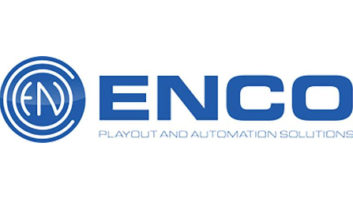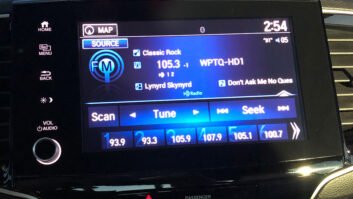Vancouver, British Columbia As a voice-over actor, I always tell people that I have no marketable skills, which is why I talk for a living.
I came to the microphone by way of the camera and entered into voice work with no connection to radio or gear whatsoever. So it’s funny to me that I’m writing about equipment, especially for a radio industry publication.
However, if I was to maintain my voice clients after the move from Los Angeles to Vancouver I had to become a daily user of a crucial piece of equipment to many in commercial production and the radio industry: a codec.

The author and his Mayah Sporty ISDN needed
When I committed to living in Vancouver I needed to build a home studio with ISDN to use the codec. Since I’m “technically challenged,” that was a scary thought for me. I bought my first codec about nine years ago and have owned three others since. My requirements for a codec have been pretty simple. Make it: 1. Easy. 2. Quiet and 3. Small. And so enters the Mayah Sporty.
I have used products from two other familiar codec suppliers but those never really fit the bill. One codec worked well and was fairly straightforward but it was a double-rack-space-beast. When doing a session I am both engineer (kinda) and talent, and my equipment needs to be right next to me. I have a compact workspace and don’t like feeling swallowed up by too much equipment.
Another model was just too clunky and loud for me. A third, a software-based codec, I liked at first because it was compact, but I soon discovered it was subject to all the vulnerabilities of a PC (e.g., not Mac-compatible) and it didn’t allow me to record and send audio at the same time. The ideal way to use it was with a separate computer and that brought me back to more equipment.
I’ve always looked for the least amount of gear with the best possible sound. So my pursuit for the ideal codec lead me face-first into the Mayah Sporty.
Aside from looking extremely cool, it was about the size of a Mac mini. It has its own mixer so I could toss away my old Mackie board. At first glance, I thought the Sporty was too complicated, but I quickly got over my anxiety.
Mayah codecs have a setting called “Reporter 1,” which is pretty idiot-proof and suited this idiot pretty well. Once I set it to “Reporter 1” mode the world quickly fell into place. Also, Mayah designed an easy way of controlling the Sporty by networking it to the computer. I can add and store my clients’ dial-ups and connect to them with the click of a mouse.
High end
One of my favorite things about the Sporty is its auto-recognition feature. It literally recognizes any codec or algorithm that is thrown at it. No need to set the Mayah at all, it automatically knows what it’s talking to and how. I love it!
I also use the Sporty for phone patch sessions. When my clients call my Sporty from a landline, the Mayah recognizes that it’s communicating with a regular phone. It has truly changed my recording life.
Ron Guensche of EDnet (who now sells and supports them) helped me successfully put the Sporty through its paces against just about every codec out there.
Another amazing feature is that the Sporty can connect to an APT codec without any bridging. [Editor’s Note: High-end high-bandwitch APT codecs are popular with many commercial and film post-production studios.] That’s a cost saver for everyone in my business.
The Sporty’s not cheap, but I believe it’s a great investment because Mayah has made it “future proof.”
My line of work is high-fidelity and mission-critical so connections have to be reliable and high quality. Though Source-Connect seems to be the only current player for real-time gigs using the Internet (instead of ISDN), it’s pretty clear that the Internet is where it’s all heading. Other areas are doing this already, but for commercial production, ISDN is still the only game in town. The Mayah is equipped with many ways of connecting via the Internet (and otherwise). That’s territory I’ve not yet needed to explore, but I do know that as we evolve, the Mayah Sporty is designed to evolve with us.
Could the Sporty be even more user friendly? Sure, but I understand that Mayah is working on that as well as making its Web-based software Mac-compatible. Overall, I think the Sporty is a great product for anyone looking for compact size, sleek design, stellar quality and ease of use.
Bill Mondy is a voice-over artist.
For information, contact Mayah Communications at (360) 618-1474 or visitwww.mayah.com.












